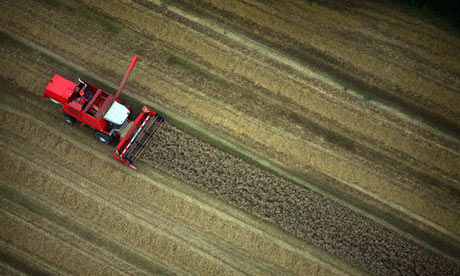Food prices expected to rise after second wettest summer on record
Poor UK harvest combined with steadily rising world price of grain contribute to upward pressure on prices.

Wheat yields in England are down by almost 15% on the five-year average. Photograph: Christopher Furlong/Getty Images
The second wettest summer on record has blighted UK harvests and will lead to food price rises, farmers and retailers have warned.
Wheat yields in England are down by almost 15% on the five-year average, the National Farmers' Union (NFU) reported, with some areas in the west of England suffering worst from the summer rain.
The world price of grain has already been rising in recent months following a heatwave in Russia and the worst drought in 50 years in the US, which destroyed 45% of corn and 35% of the soya bean crop.
Richard Dodd of the British Retail Consortium said: "There certainly are price pressures in the system, which are coming from poor wheat harvests in this country but also in the other big wheat producing countries.
"The most recent figures are that wheat prices are up something like 29% compared with a year ago.
"Our own figures for the shop price inflation for food show that it has been very, very stable – it has been 3.1% for the last three months which is actually a two-year low. There is no food price explosion going on but there are pressures in the system that will work through.
He added that a "fiercely competitive retail market" was also helping to protect customers from the worst effects of price pressures.
After hosepipe bans earlier in the year, the dramatically wet summer – the wettest since 1912 according the Met office records – has also retarded the growth of fruit and vegetables and brought lower yields and quality overall.
Morrisons' Martyn Jones told the BBC that carrots would be less sweet and volumes of some food were down around 25% across most root crops.
The NFU president, Peter Kendall, said: "There are many farmers who are down 25% to 30% on the wheat crop. In some cases you looked from the outside and you thought, this crop will do over four tonnes to the acre – and it's been struggling to do three and some cases two tonnes to the acre."
"It's been soul-destroying for the farmers growing the crops," he said.
Kendall added that the increase in the global price of wheat by 30% over the past year was also putting pressures on pig and poultry farmers, who rely on grain to feed their livestock.
"The challenge for the pig and poultry market is trying to make sure that retailers pay a fair price, because in pigs 50% of the cost is grain, poultry it's 60% – and these farmers at the moment, because the prices haven't responded yet, they're actually saying I'm not going to fill my sheds with poultry or pigs any more."
Speaking on BBC Radio 4's Today programme, Tim Lang, professor of food policy at London's City University, said there were deeper structural issues to global food market price rises that politicians were not taking seriously and which were hurting the poor disproportionately.
Lang said the poorest 10% of households in the UK had seen a drop in food affordability of 20% in the last eight years and that this was also a "disaster for public health" as the price of healthier produce such as fruit had risen by 34% in the last five years.
Lang, who coined the phrase "food miles", said: "Most analysts think the long drop in food prices, of affordability, is over. We are now in a new world, a world of new fundamentals, not just bad weather this year but a long-term squeeze."
He added that issues such as water stress, climate change, urbanism and market speculation meant that "the old imperialist British view that we can just get food and that others will feed us is probably over".
Friends of the Earth called for an overhaul of agricultural production to fend off climate-related shocks.
FoE campaigner Vicki Hird said: "Climate change is already damaging food production and causing prices to soar – and the situation is expected to get worse without urgent action to slash emissions.
"Our agricultural system is also in desperate need of overhaul to meet the twin challenges of feeding a growing world population and protecting the planet."
No hay comentarios:
Publicar un comentario